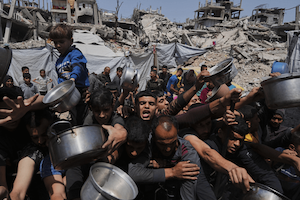Israel Obstructs Gaza Aid, Raising Risk of Widespread Famine

After enduring two years of war, Palestinian civilians in the Gaza Strip are now facing an even more dire situation. Severe food shortages could lead to a large-scale famine, with up to 500,000 people at risk of death. Although a ceasefire agreement was reached between Israel and Hamas in January, negotiations later failed, and Israel resumed its blockade of Gaza in March. It wasn’t until late May that limited supplies were allowed to enter again.
Currently, two main organizations are responsible for distributing aid. One is the United Nations. According to the Israeli military, even when UN aid enters Gaza, it ends up under Hamas control. On the 27th of last month, 55 UN aid trucks entering Gaza were emptied by crowds before reaching their destinations. Meanwhile, hundreds more UN food trucks remain stuck near the Kerem Shalom border crossing into southern Gaza, unable to enter. UN Secretary-General’s spokesperson Stéphane Dujarric blamed Israel for "massive bureaucratic obstacles and security issues" that are "preventing us from doing our job."
The other organization is the Gaza Humanitarian Foundation (GHF), established with support from the United States and Israel. GHF operates four food distribution stations in southern and central Gaza and claims its system prevents aid from being seized by Hamas. However, the number of distribution sites is too small, their schedules irregular, and it is questionable whether civilians can safely travel long distances to access them. GHF stations are often overcrowded and have even come under fire from Israeli soldiers. According to the UN human rights agency, hundreds of people have been killed near these GHF stations. GHF’s own Palestinian staff have also been killed by Hamas gunmen. This has prompted the UN and other aid groups to call for GHF's shutdown, condemning the foundation's methods as inefficient and dangerous.
Israeli Prime Minister Benjamin Netanyahu recently denied that anyone in Gaza is starving. However, former U.S. President Donald Trump disagrees. His Middle East envoy, Steve Witkoff, plans to visit the Gaza Strip to inspect the distribution of aid. Israel’s hardline stance is also shifting international perspectives. The European Union is considering suspending a major scientific research program, while France, the UK, and Canada are planning to formally recognize the State of Palestine in September.
Although Israeli society has long resisted the label of "genocide," a turning point came on the 29th when 31 prominent Israeli figures published an open letter in The Guardian, condemning Israel for causing famine in Gaza and calling for severe sanctions. Two major Israeli human rights organizations—B’Tselem and Physicians for Human Rights Israel—have also released reports accusing Israel of implementing a genocidal policy in Gaza.
- 72 reads
Human Rights
Fostering a More Humane World: The 28th Eurasian Economic Summi

Conscience, Hope, and Action: Keys to Global Peace and Sustainability

Ringing FOWPAL’s Peace Bell for the World:Nobel Peace Prize Laureates’ Visions and Actions

Protecting the World’s Cultural Diversity for a Sustainable Future

Puppet Show I International Friendship Day 2020

